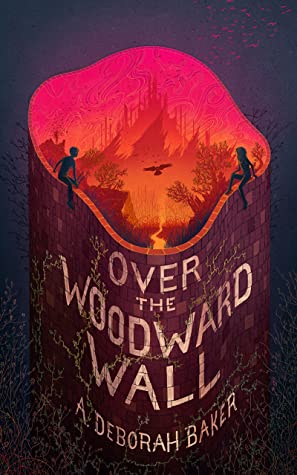
Published on: 6th October 2020
Goodreads

"Writing as A. Deborah Baker, New York Times bestselling and award-winning author Seanan McGuire introduces readers to a world of talking trees and sarcastic owls, of dangerous mermaids and captivating queens in Over the Woodward Wall, an exceptional tale for readers who are young at heart.
If you trust her you’ll never make it home…
Avery is an exceptional child. Everything he does is precise, from the way he washes his face in the morning, to the way he completes his homework – without complaint, without fuss, without prompt.
Zib is also an exceptional child, because all children are, in their own way. But where everything Avery does and is can be measured, nothing Zib does can possibly be predicted, except for the fact that she can always be relied upon to be unpredictable.
They live on the same street.They live in different worlds.
On an unplanned detour from home to school one morning, Avery and Zib find themselves climbing over a stone wall into the Up and Under – an impossible land filled with mystery, adventure and the strangest creatures.
And they must find themselves and each other if they are to also find their way out and back to their own lives."
The first thing you should probably know is that Over the Woodward Wall began its existence as that most magical of things – a book inside another book. In Seanan McGuire’s Middlegame, Over the Woodward Wall is the name of book written by a genius alchemist to sneakily teach the principles of alchemy to the world’s children.
More or less.
With Middlegame gaining a huge amount of acclaim, someone was smart enough to ask McGuire if she’d also like to write Over the Woodward Wall. And, using the pseudonym her fictional alchemist used, she did!
In Over the Woodward Wall, two perfectly normal children, Zib and Avery, encounter a wall on their way to school – a wall that shouldn’t be there. And for different reasons, they climb over it.
When they drop down on the other side, they’re not in our world any more. And the wall has disappeared behind them, leaving them stranded in a place called the Up-and-Under. How to get home? And do both of them even want to?
It’s impossible not to draw comparisons between Over the Woodward Wall and The Wizard of Oz, simply because both books feature an all-important road that the main characters must follow to their destination. But it’s not a fair comparison, because the road of Over the Woodward Wall is not like other roads – just like this book isn’t like other books. Instead of a yellow brick road leading to a wizard who isn’t, the improbable road is…well, I’ll let one of the inhabitants of the Up-and-Under explain it;
“Bricks made from sunlight on sand and moonlight on mist and starlight on water? Improbable! A single road that runs the length of an entire kingdom? Improbable! A city of untold marvels and incredible wonders waiting at its end? Improbable! So this, then, must be the improbable road, and if you walk it long enough, all your questions will be answered, for what could be more improbable than a happy ending?”
It’s to the Impossible City that Zib and Avery need to go if they want to go home – or even if they don’t. And off they go.
Over the Woodward Wall is full of McGuire’s signature wry humour and wisdom; there’s something in the tone of it that’s reminiscent of her Wayward Children series (and maybe that’s only to be expected, since both feature a set of wayward children. I wonder what Door would open for Avery, if he got a Door instead of a Wall? I’m willing to bet Zib, at least, would get a Nonsense Door.) But if the Wayward Children books are written for adults who remember being younger (and who haven’t quite given up on their Doors), Over the Woodward Wall very much belongs to actual children – whether that means people who are still children by number of years lived, or the inner child inside the most grown of grown-ups. This book is for either or both.
“Not knowing things means you have room to learn, and leaning’s about the most important thing there is, so the more ignorant you are, the more important you can be.”
Like all the best writers, McGuire doesn’t talk down to her audience. And like the very best writers, she doesn’t try to simplify or prettify things for younger readers. It’s as Madeleine L’Engle said: “You have to write the book that wants to be written. And if the book will be too difficult for grown-ups, then you write it for children.” There’s an extra layer to this if you’ve already read Middlegame, and know that Over the Woodward Wall is meant to be spreading the secrets of the universe at the feet of children. But even without that aspect of it, there’s plenty of pointed reminders and lessons here for children and grown-ups alike.
“Some monsters speak, child,” said the beast. “The very best monsters speak like kings and queens, eloquent and alluring, and the trick is learning not to listen. If you listen to those monsters, they’ll have your heart out before you realize how much danger you’re in.”
Which is not to say, at all, that Over the Woodward Wall is just a 200+ page book of morals or something. It’s strange and wonderful and there’s a lot of laughter mixed into the bittersweet, just as there’s a perfect balance struck between whimsy and a special kind of terrifying.
“Everything with wings is a coward,” said the Crow Girl. “Even the things that want to be brave, the hawks and eagles and vultures and pelicans, they’re all cowards. To have wings is to know how to fly away.” She paused before adding, thoughtfully, “Maybe emus aren’t cowards. They have wings, but they’ve forgotten how to fly. Maybe they can learn to be brave.”
You don’t, at all, have to have read Middlegame to appreciate Over the Woodward Wall – it stands alone on its own two feet without any need for bulwarks, and should be judged for itself, not for its connection to Middlegame. Even if those who’ve read both will see plenty of connections between the themes, and even the characters, of both books, I don’t really think Middlegame will help readers understand Over the Woodward Wall. For that, you need to study this book as if every motif in it is as deeply meaningful as I’m sure it is; you need to read each page twice, and maybe three times, and think about what you’ve read.
I mean, you can also just read it as a fun story! Because it is that, and it doesn’t have to be more than that if you don’t want it to.
But you can also ponder the symbolism of the King of Cups and Queen of Wands – figures originally from the tarot, but given new layers of meaning here. You can think over the power of names, and nicknames, and screams. If you’re an adult, maybe you’ll be reminded that children are people too, and to treat them as if they are. There’s different kinds of bravery, and different ways to be good, and no one can live up to all of them all of the time.
Sometimes anger is a good, true thing, because the world is so often unfair, and unfairness deserves to be acknowledged. But all too often, anger is another feeling in its Sunday clothes, sadness or envy or–most dangerous of all–fear.
Over the Woodward Wall might have started its existence as a secret alchemical primer within another book, but it packs a hell of a lot more punch than that now. It’s McGuire whispering the secrets of life, the universe, and everything in your ear, guiding you along the shining improbable road to your own Impossible City.
“Frightened means you’ve the sense to be afraid, and it’s cowards who get things done, more often than not.”
The only way to reach the Impossible City is to walk the improbable road. So pick up this book and get walking. How else are you going to get there?



Ahh, I loved Middlegame so much, it was hard for me to try to review this book independently from it. But you’ve done a great job at reviewing it for a non-Middlegame reader. I hope lots of readers pick it up so we get the sequels!
I have to admit, I think I need to read Middlegame a couple more times – I didn’t dislike it at all, I just felt like I wasn’t catching everything I was supposed to. But yes, gods, we MUST have sequels, for Over the Wall and Middlegame both – I want them all!